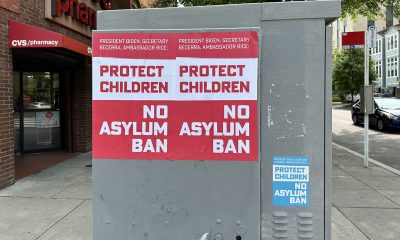National
Bi-national couples in ‘surreal’ wait for DOMA decision
150 attorneys in training to assist when ruling comes


Heather (left) and Maria “Mar” del Mar have already filed their I-130 applications in anticipating of a ruling against DOMA. (Photo courtesy of Immigration Equality)
After being together for five years, Heather and Maria “Mar” del Mar are making their final preparations in anticipation of a ruling from the Supreme Court that could mean they can stay together in the United States.
Heather, a U.S. citizen, and Mar, a Spanish national, have already completed their I-130 marriage-based green card application and have sent it to the LGBT group Immigration Equality with the expectation that the high court will strike down the Defense of Marriage Act.
“We’re actually largely done with that,” Heather said. “Our intention on that front is, of course, to file that petition the first day it’s legally viable to do so.”
Although Mar has legal status because she’s living in the United States on a work visa, it expires in November. Section 3 of DOMA, which prohibits federal recognition of same-sex marriage, has blocked the New York City couple, who married in 2011, from a more permanent solution.
In March of last year, U.S. Customs & Immigration Enforcement denied Heather and Maria a marriage-based green card based on an earlier application, citing DOMA as the reason. They’re one of the estimated 28,500 bi-national same-sex couples in danger of separation.
That could change in the coming days. The Supreme Court is expected to deliver a ruling on the constitutionality of DOMA as a result of pending litigation along with ruling in a separate case challenging California’s Proposition 8.
If the court rules DOMA is unconstitutional, blocking the U.S. government from enforcing it, USCIS will have no legal reason to withhold the marriage-based green card from Heather and Mar.
Heather, a marketing director for a global non-profit organization in New York, said the wait for the decision has been “kind of surreal” and what’s been on the couple’s minds in the days heading to the ruling.
“We look at each other every night before we go to bed I would say for the last few weeks, where it’s been kind of like a month countdown, and we’ve said, “Oh my God, what is it going to really be like the day after?” she said. “How much is our life going to change when this issue isn’t a huge weight on our relationship and even on our everyday thought process.”
Mar, who works in marketing for a Spanish-language newspaper in New York, said a ruling against DOMA would lift a considerable burden because they are unable to plan for the future as they fear separation.
“We are really nervous because this would be a big change in our life,” Mar said. “We are very excited.”
As of today, the Supreme Court calendar designates only June 20 and June 24 as days on which opinions will be handed down; But with 14 cases yet to be decided, it is widely expected that they will add another day to the calendar, either June 26 or June 27 and the decisions for the marriage will be announced at that time.
And Heather and Mar, who are among the plaintiffs in Immigration Equality’s lawsuit against DOMA, already have plans. On the last Saturday of the month, they’re inviting friends and family to come to their home to celebrate the moment when the federal government will view their relationship as legally equal to others.
“We actually already have — I guess this is probably superstitious; I shouldn’t say this out loud — but we actually already have a celebration planned for family and friends — we have to be optimistic — for Saturday night on the 29th,” Heather said. “So, we’re celebrating at our place.”
And what if the Supreme Court rules in favor of DOMA? Heather said it’s not an outcome they like to consider, but in that event, they’d pursue additional litigation, find a way to renew Mar’s work visa and push for the inclusion of gay couples in comprehensive immigration reform legislation.
“To be honest, it will just be devastating; all of those things are just technically the things that we’ll do,” Heather said. “I’ll tell you what we’re going to do; we’re going to start a family anyway because we refuse to live at the effect of our circumstances. We’ve already postponed things in our life much more than is fair — and we’ll consider the option of moving to Spain where our marriage is recognized.”
But Heather and Mar are just one of many bi-national same-sex couples readying for a Supreme Court ruling that would ensure they can stay together in the United States.
Rachel Tiven, executive director of Immigration Equality, said she’s expecting thousands of green card applications from bi-national same-sex couples in the months following a court ruling against DOMA.
“We think that there will be over the first year many thousands,” Tiven said. “I think in the remaining five months of the year, we’ll see something between 2,000 and 10,000 applications, but that’s a guess.”
In the meantime, Tiven said her organization is already preparing some applications for same-sex bi-national couples and making plans for others to renew applications that were previously denied.
“We’re preparing some families who will file immediately if the Supreme Court will enable them to do so,” Tiven said. “Other families who filed a long time ago — either because they were plaintiffs, or because it was a step to seeking deferred action — we are asking the administration, for those who were denied, we’re asking the administration to reopen those applications so they don’t have to file all over again, and don’t have to pay the fee again.”
In order to facilitate the expected increase in couples filing marriage-based green card applications, Immigration Equality’s legal team has conducted two trainings last week for attorneys who have signed up to assist couples with their petitions following a court ruling striking down Section 3 of DOMA.
Steve Ralls, a spokesperson for Immigration Equality, said 150 lawyers from across the country to date have joined that network of attorneys and have taken part in one of those two trainings.
“As part of that training, our legal team discussed topics related to identifying issues that may arise for same-sex bi-national couples during implementation following the court’s ruling,” Ralls said. “A key goal is to ensure that attorneys working with LGBT families can also serve as watchdogs during that critical implementation period and report any issues they encounter with relevant government agencies in their processing of green card applications for affected families.”
Another couple making preparations in anticipation of a court ruling is Rachel Wilkins and Jennifer Blum, a New Jersey couple that married a year-and-a-half ago. Blum, a New Jersey native, is awaiting the opportunity to sponsor Wilkins, a British national, for residency in the United States.
The couple has never filed a marriage-based green card application before, but Blum, an attorney, said they’ve already hired an attorney to help them through the process in anticipation of a ruling against DOMA.
“We’ve hired an attorney to prepare our application for us,” Blum said. “So we’ve been really just trying to get all the paperwork together, and we’re excited for this decision to finally come to fruition, and we just want to move on with our lives.”
Wilkins, a curator who’s in the country on work visa, said she shares a sense of optimism that the Supreme Court will issue a decision that renders Section 3 of the the Defense of Marriage Act inoperable.
“I think we’re feeling optimistic,” Wilkins said. “We were watching the Supreme Court blog to see the orders handed down just waiting to see the right decision made.”
The couple came to D.C. when the oral arguments took place at the Supreme Court in March and had the opportunity to meet lesbian New Yorker Edith Windsor, who filed the lawsuit that’s currently before the court.
“We walked up on the steps and I lost it … because it’s just the culmination of so many people’s hard work, sweat, they’ve given so much to be able to get to this point where we could get this case in front of the Supreme Court, and for the Supreme Court to finally do the right thing, and for justice to be done,” Blum said.
Should the court strike down DOMA, Blum said they’ll celebrate by gathering at the Stonewall Inn in New York City, where riots began in 1969 that were considered the start of the modern gay rights movement.
“Legally, factually, I just can’t see the Supreme Court determining any other way,” Blum said. “Like I said, there’s no other option.”
Lavi Soloway, a gay immigration attorney at Masliah & Soloway and co-founder of The DOMA Project, said his firm worked for several months on preparing to file new marriage-based green card applications — some on the day the court issues a decision against DOMA — and has several filed in 2011 and 2012 that haven’t yet been denied.
“The couples have undertaken the preparation with the understanding that that the Supreme Court ruling on DOMA is not something that we can predict in advance, but it would be fair to say that their perspective, like mine, is cautiously optimistic,” Soloway said.
CORRECTION: An earlier version of this article misattributed quotes to Jennifer Blum and Rachel Wilkins. The Blade regrets the error.
Federal Government
Lambda Legal praises Biden-Harris administration’s finalized Title IX regulations
New rules to take effect Aug. 1

The Biden-Harris administration’s revised Title IX policy “protects LGBTQ+ students from discrimination and other abuse,” Lambda Legal said in a statement praising the U.S. Department of Education’s issuance of the final rule on Friday.
Slated to take effect on Aug. 1, the new regulations constitute an expansion of the 1972 Title IX civil rights law, which prohibits sex-based discrimination in education programs that receive federal funding.
Pursuant to the U.S. Supreme Court’s ruling in the landmark 2020 Bostock v. Clayton County case, the department’s revised policy clarifies that discrimination on the basis of sexual orientation and gender identity constitutes sex-based discrimination as defined under the law.
“These regulations make it crystal clear that everyone can access schools that are safe, welcoming and that respect their rights,” Education Secretary Miguel Cardona said during a call with reporters on Thursday.
While the new rule does not provide guidance on whether schools must allow transgender students to play on sports teams corresponding with their gender identity to comply with Title IX, the question is addressed in a separate rule proposed by the agency in April.
The administration’s new policy also reverses some Trump-era Title IX rules governing how schools must respond to reports of sexual harassment and sexual assault, which were widely seen as imbalanced in favor of the accused.
Jennifer Klein, the director of the White House Gender Policy Council, said during Thursday’s call that the department sought to strike a balance with respect to these issues, “reaffirming our longstanding commitment to fundamental fairness.”
“We applaud the Biden administration’s action to rescind the legally unsound, cruel, and dangerous sexual harassment and assault rule of the previous administration,” Lambda Legal Nonbinary and Transgender Rights Project Director Sasha Buchert said in the group’s statement on Friday.
“Today’s rule instead appropriately underscores that Title IX’s civil rights protections clearly cover LGBTQ+ students, as well as survivors and pregnant and parenting students across race and gender identity,” she said. “Schools must be places where students can learn and thrive free of harassment, discrimination, and other abuse.”
Michigan
Mich. Democrats spar over LGBTQ-inclusive hate crimes law
Lawmakers disagree on just what kind of statute to pass

Michigan could soon become the latest state to pass an LGBTQ-inclusive hate crime law, but the state’s Democratic lawmakers disagree on just what kind of law they should pass.
Currently, Michigan’s Ethnic Intimidation Act only offers limited protections to victims of crime motivated by their “race, color, religion, gender, or national origin.” Bills proposed by Democratic lawmakers expand the list to include “actual or perceived race, color, religion, gender, sexual orientation, gender identity or expression, ethnicity, physical or mental disability, age, national origin, or association or affiliation with any such individuals.”
Democratic Gov. Gretchen Whitmer and Attorney General Dana Nessel have both advocated for a hate crime law, but house and senate Democrats have each passed different hate crimes packages, and Nessel has blasted both as being too weak.
Under the house proposal that passed last year (House Bill 4474), a first offense would be punishable with a $2,000 fine, up to two years in prison, or both. Penalties double for a second offense, and if a gun or other dangerous weapons is involved, the maximum penalty is six years in prison and a fine of $7,500.
But that proposal stalled when it reached the senate, after far-right news outlets and Fox News reported misinformation that the bill only protected LGBTQ people and would make misgendering a trans person a crime. State Rep. Noah Arbit, the bill’s sponsor, was also made the subject of a recall effort, which ultimately failed.
Arbit submitted a new version of the bill (House Bill 5288) that added sections clarifying that misgendering a person, “intentionally or unintentionally” is not a hate crime, although the latest version (House Bill 5400) of the bill omits this language.
That bill has since stalled in a house committee, in part because the Democrats lost their house majority last November, when two Democratic representatives resigned after being elected mayors. The Democrats regained their house majority last night by winning two special elections.
Meanwhile, the senate passed a different package of hate crime bills sponsored by state Sen. Sylvia Santana (Senate Bill 600) in March that includes much lighter sentences, as well as a clause ensuring that misgendering a person is not a hate crime.
Under the senate bill, if the first offense is only a threat, it would be a misdemeanor punishable by one year in prison and up to $1,000 fine. A subsequent offense or first violent hate crime, including stalking, would be a felony that attracts double the punishment.
Multiple calls and emails from the Washington Blade to both Arbit and Santana requesting comment on the bills for this story went unanswered.
The attorney general’s office sent a statement to the Blade supporting stronger hate crime legislation.
“As a career prosecutor, [Nessel] has seen firsthand how the state’s weak Ethnic Intimidation Act (not updated since the late 1980’s) does not allow for meaningful law enforcement and court intervention before threats become violent and deadly, nor does it consider significant bases for bias. It is our hope that the legislature will pass robust, much-needed updates to this statute,” the statement says.
But Nessel, who has herself been the victim of racially motivated threats, has also blasted all of the bills presented by Democrats as not going far enough.
“Two years is nothing … Why not just give them a parking ticket?” Nessel told Bridge Michigan.
Nessel blames a bizarre alliance far-right and far-left forces that have doomed tougher laws.
“You have this confluence of forces on the far right … this insistence that the First Amendment protects this language, or that the Second Amendment protects the ability to possess firearms under almost any and all circumstances,” Nessel said. “But then you also have the far left that argues basically no one should go to jail or prison for any offense ever.”
The legislature did manage to pass an “institutional desecration” law last year that penalizes hate-motivated vandalism to churches, schools, museums, and community centers, and is LGBTQ-inclusive.
According to data from the U.S. Department of Justice, reported hate crime incidents have been skyrocketing, with attacks motivated by sexual orientation surging by 70 percent from 2020 to 2022, the last year for which data is available.
Twenty-two states, D.C., Puerto Rico, and the U.S. Virgin Islands have passed LGBTQ-inclusive hate crime laws. Another 11 states have hate crime laws that include protections for “sexual orientation” but not “gender identity.”
Michigan Democrats have advanced several key LGBTQ rights priorities since they took unified control of the legislature in 2023. A long-stalled comprehensive anti-discrimination law was passed last year, as did a conversion therapy ban. Last month the legislature updated family law to make surrogacy easier for all couples, including same-sex couples.
A bill to ban the “gay panic” defense has passed the state house and was due for a Senate committee hearing on Wednesday.
Indiana
Drag queen announces run for mayor of Ind. city
Branden Blaettne seeking Fort Wayne’s top office

In a Facebook post Tuesday, a local drag personality announced he was running for the office of mayor once held by the late Fort Wayne Mayor Tom Henry, who died last month just a few months into his fifth term.
Henry was recently diagnosed with late-stage stomach cancer and experienced an emergency that landed him in hospice care. He died shortly after.
WPTA, a local television station, reported that Fort Wayne resident Branden Blaettne, whose drag name is Della Licious, confirmed he filed paperwork to be one of the candidates seeking to finish out the fifth term of the late mayor.
Blaettner, who is a community organizer, told WPTA he doesn’t want to “get Fort Wayne back on track,” but rather keep the momentum started by Henry going while giving a platform to the disenfranchised groups in the community. Blaettner said he doesn’t think his local fame as a drag queen will hold him back.
“It’s easy to have a platform when you wear platform heels,” Blaettner told WPTA. “The status quo has left a lot of people out in the cold — both figuratively and literally,” Blaettner added.

The Indiana Capital Chronicle reported that state Rep. Phil GiaQuinta, who has led the Indiana House Democratic caucus since 2018, has added his name to a growing list of Fort Wayne politicos who want to be the city’s next mayor. A caucus of precinct committee persons will choose the new mayor.
According to the Fort Wayne Journal Gazette, the deadline for residents to file candidacy was 10:30 a.m. on Wednesday. A town hall with the candidates is scheduled for 6 p.m. on Thursday at Franklin School Park. The caucus is set for 10:30 a.m. on April 20 at the Lincoln Financial Event Center at Parkview Field.
At least six candidates so far have announced they will run in the caucus. They include Branden Blaettne, GiaQuinta, City Councilwoman Michelle Chambers, City Councilwoman Sharon Tucker, former city- and county-council candidate Palermo Galindo, and 2023 Democratic primary mayoral candidate Jorge Fernandez.
-

 Africa4 days ago
Africa4 days agoCongolese lawmaker introduces anti-homosexuality bill
-

 District of Columbia1 day ago
District of Columbia1 day agoReenactment of first gay rights picket at White House draws interest of tourists
-

 World5 days ago
World5 days agoOut in the World: LGBTQ news from Europe and Asia
-

 Arizona1 day ago
Arizona1 day agoAriz. governor vetoes anti-transgender, Ten Commandments bill










